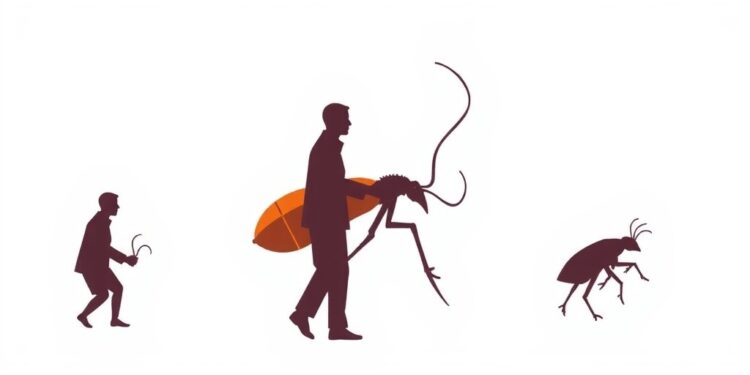Researchers have been investigating the complex ways in which organisms adapt to their environments, particularly in response to threats like parasites and pathogens. A recent study led by Amanda Gibson, an assistant professor at the University of Virginia, is set to reshape our understanding of these evolutionary dynamics. Gibson’s research focuses on how organisms, including the common nematode Caenorhabditis elegans, evolve behaviors to avoid infection, challenging traditional notions that prioritize immune systems as the primary form of defense against diseases.
The significance of Gibson’s work is underscored by the $1.5 million grant awarded to her by the National Science Foundation. This prestigious CAREER grant, intended for early-career faculty engaged in both research and education, will enable her to explore the interaction between organismal movement and disease management. Notably, her investigation draws parallels between her research themes and the social distancing measures adopted during the COVID-19 pandemic, which demonstrated the efficacy of avoidance strategies when medical solutions were unavailable.
Gibson elucidates the premise of her work by stating that parasites and pathogens don’t uniformly populate environments; instead, they thrive in localized hotspots. This spatial distribution means hosts face varied risks depending on their location. Rather than relying solely on immune responses to combat infections, Gibson suggests that simply relocating away from infection-prone areas may be a more effective survival strategy. Her approach shifts the focus from internal biological defenses to external behavioral adaptations, asking whether organisms’ ability to navigate spaces is a vital evolutionary trait.
A cornerstone of her research will involve studying C. elegans, a smaller and more manageable subject for laboratory-based examinations compared to larger organisms, such as migratory birds or butterflies. This microscopic worm offers a unique opportunity to observe both its laboratory behavior and its natural responses to environmental challenges. Gibson plans to employ a variety of methodologies, including experimental setups, field studies, and evolutionary modeling, to investigate how the presence of parasites affects movement patterns, how dispersal can mitigate the risk of infection, and if reliance on movement can result in fewer requirements for alternative immune strategies.
Gibson poses an important question: does the ability to avoid infected environments reduce the need for other costly immunological defenses? By addressing this inquiry, her research seeks to broaden our understanding of how host populations can evolve to develop robust survival mechanisms while minimizing energy expenditure on immune responses. This concept reflects a paradigm shift in the way scientists consider disease management in ecological contexts.
Further advancing her investigation’s relevance, Gibson draws a parallel between her findings and the recent experience of the global population during the COVID-19 pandemic. Public health measures, underpinned by avoidance strategies like social distancing and quarantine, effectively curtailed the spread of the virus. This led to a reevaluation of how avoidance capabilities can be instrumental in managing outbreaks. Just as humans employed physical distancing to protect themselves, organisms in nature may possess similar tactics, highlighting a broader evolutionary principle in disease ecology.
However, Gibson’s research is not solely concerned with elucidating evolutionary strategies; it also underscores her commitment to education, particularly for community college transfer students in the field of science. Transitioning from community colleges to a four-year institution can be daunting, as students often arrive without a solid network of peers and mentors. Recognizing these challenges, Gibson aims to facilitate smoother integrations into the biological sciences at UVA.
In collaboration with Piedmont Virginia Community College, Gibson is introducing hands-on research experiences for prospective transfer students, providing them with the opportunity to engage with scientific inquiries before they officially enroll at UVA. Her initiative includes summer research fellowships, which afford incoming students the chance to conduct related research in her lab, allowing them to build both confidence and skills in a supportive environment.
To further support this group of scholars, Gibson is developing a specialized course tailored specifically for third-year transfer students. The course is intended to acclimate these students to the research community within the biology department, offering mentorship opportunities while fostering engagement with scientific literature. She believes that by addressing these transitional challenges, she can empower transfer students to thrive and integrate seamlessly into their new academic environment.
With the receipt of the NSF CAREER award marking a significant milestone in her career, Gibson emphasizes that this grant validates not just her research endeavors but also her dedication to mentorship and education. Her view of the award aligns with the NSF’s mission of funding fundamental scientific research while intertwining it with educational pathways. The acknowledgment of her contributions points to the potential for innovative practices that benefit both the study of evolutionary biology and the development of future scientists.
As her research progresses, it holds promise for uncovering new dimensions of host-parasite dynamics while also enriching the academic landscape for underserved populations in science. By integrating her research with educational initiatives, Gibson stands at the forefront of advancing both scientific knowledge and the accessibility of higher education in biology. Through her efforts, she aspires to not only drive forward the frontiers of research but also cultivate a new generation of scientists equipped with the tools and confidence necessary for their journey in academia.
In summary, Amanda Gibson’s groundbreaking work on host movement and its implications on infection control is set to challenge the prevailing paradigms of immunological defense, drawing insightful connections between ecological behavior and public health strategies. Her dual emphasis on research and community-oriented educational programs highlights the need to foster inclusivity in the scientific community while promoting a holistic understanding of disease dynamics in the natural world.
Subject of Research: Evolutionary biology, host-parasite dynamics, avoidance strategies against disease
Article Title: Evolutionary Adaptations: How Avoidance Strategies Shape Disease Management
News Publication Date: October 2023
Web References: None
References: None
Image Credits: None
Keywords: evolutionary biology, parasite avoidance, C. elegans, NSF CAREER grant, community college transfer students, public health strategies, disease dynamics.




